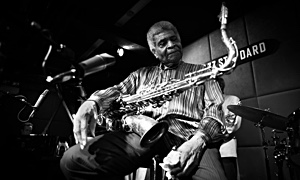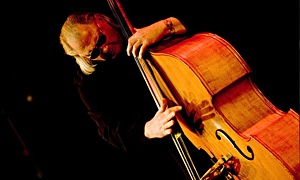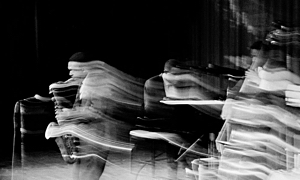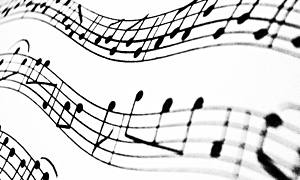Home » Jazz Articles » On and Off the Grid » What's The Point, Part 1
What's The Point, Part 1
In The Beginning
By the time I was 14 years old I had been studying and playing the guitar for seven years and was playing at church dances in and around New York City. I played in a few different bands, and because my repertoire was limited, I would bring music with me 'til I could memorize the songs that were needed. Sometimes the leader of the group would bring the music. Most importantly, I was playing my guitar in front of an audience. That need became a very significant part of my life. As a beginner performer, there were many times I played for no pay. I needed the experience. I got my union card when I was 15 years old and for all intents and purposes I was a professional musician. Six months later I was backing up '50s-type singing groups at rock and roll shows and getting paid. At eighteen I was a full-time musician.A year before, while still in high school, I started playing in nightclubs; I'd work till three or four in the morning, go home and sleep two or three hours and then go to school. I did this two or three times a month, but I did work every weekend. I was like most young people who had part-time jobs to earn money, except my part time job was being a musician. Through my earnings I was able to buy the things I needed to sustain myself as a musician: new guitar and amp, strings, picks, a tuxedo (standard dress code for some gigs), guitar lessons and eventually a car.
When I graduated from high school. I went to college but my heart was into playing. I dropped out of college and started working as a full-time musician, which meant I had to get a cabaret license; during the '50s and up to 1967, in order to work in New York City nightclubs, a cabaret license was a requirement. You couldn't get a license until you were fingerprinted to see if you were convicted or arrested for any crime. Of course I wasn't, but many great artists, such as Chet Baker, Thelonious Monk, Charlie Parker and Billie Holiday had their cabaret licenses suspended because of drug charges, and Lenny Bruce, for his reputed obscenity.
I remember sitting on a bench filling out the application and sitting next to me was a face I recognized, but couldn't place. He was very congenial and we spent our time waiting and talking. I finally said, "You look so familiar, have we met before?" I introduced myself and he put out his hand and said "I'm Maynard Ferguson." I practically fainted. I'd seen Maynard play many times at Birdland—my home away from home. A few minutes later he was called up to the window, finished, smiled and said goodbye. To me that was a momentous experience—meeting a great artist who contributed to jazz! Up until I was fifteen, my heroes were athletes, but that all changed when I started listening to jazz and hanging out at Birdland.
In the fifties, the original Birdland had a "peanut gallery," which meant anyone under eighteen could sit in the back of the club, have soda and watch the greatest jazz musicians in the world perform. There were always two acts on the bill. My heroes and teachers were Johnny Smith, Dizzy Gillespie, J.J. Johnson, Horace Silver, The Jazz Messengers, Miles Davis with John Coltrane...the list goes on and on. Every time I discovered someone new I would buy their records and they would become part of a long list of influences and heroes. I didn't know or care about their personal lives. All I knew was, they were great players and I wanted to do what they could do, and that desire is still with me to this day.
The Sixties
In the late fifties and early sixties, musicians were paid $25-$50 dollars a night in bars and lounges. Of course the famous musicians were paid much more, but I am talking about your everyday working musician. In those days, musicians were put into categories:- Studio Musicians (recordings, jingles etc.);
- High End Club Date Players (with big-name band leaders who played parties and social functions for the rich);
- Club Date Musicians (in other states called Casuals, for Weddings, Engagement Parties, Bar Mitzvahs, etc.);
- Show Band Musicians (playing for big-name acts at nightclubs);
- Broadway Show Musicians;
- Jazz Musicians;
- Latin Musicians;
- Bar and Lounge Players;
- Classical Musicians (freelance and orchestra).
Along came the seventies. Electronic synthesizers had taken the place of many musicians. Studio musicians ended up playing for Broadway shows. When the synthesizers invaded theatre music, those musicians ended up playing weddings. Then came the disc jockeys, replacing live music with recorded music at weddings. They put those musicians out of work. The big show bands that backed up famous acts at hotels in New York City had stopped in the early seventies, and the Catskills show bands were gone by the late eighties and the musicians union was just about broken. Non-union musicians could play anywhere and the bandleaders did not worry about paying scale to their players. That also meant health and pension benefits went out the window. Before that, studio and theatre musicians who most likely started off as Big Band or Jazz musicians but needed to make a living ended up in the studios or playing in the pit for Broadway shows. While things were still good, these same musicians had a need to play jazz. In order to satisfy that need, and since they didn't need the money, they would play in bars and restaurants for no pay—the beginning of the end.
In the mid-eighties there was a rise of Jazz Departments in Colleges and Universities throughout the USA. In the past, Jazz Study was unheard of in colleges except for a few such as Boston's Berklee School of Music. All of a sudden, every school in America had a Jazz Program, offering degrees in performance. I personally think that these programs were created so that jazz musicians could work. Every kid who dreamed he could be the next Coltrane or Miles Davis, enrolled in these schools and graduated with a degree.
What this meant is that a lot of kids with degrees could play a lot of scales, understood all the modes and theory associated with jazz, and if they were lucky enough to have good teachers they could play some jazz. They weren't experienced jazz players, but the potential was there. The problem was and still is: where do they go to get this experience and did their schools teach them how to survive as musicians? The answer is a decided No! The school advisers and teachers did give them some advice: if you want to get the experience you need, go to New York, where there is great music and energy, and eventually if you're lucky, you will make it.
Wrong!
The worst part of this advice is, these kids think if they come to New York they'll take the town by storm. They were "so successful" in college; everyone told them how great they were, so they assume, by coming to the Big Apple, they'd meet lots of musicians, which they do, and they think there is so much work here, but what they find is another hundred players as good, if not, better—and most of them are out of work and barely surviving. They all have part-time jobs or "day gigs" and are living with roommates. The roommates are usually musicians and all of them have a need to play. In order to fill that need, they play at makeshift jam sessions or after-hours at some club. But playing at sessions with other musicians doesn't fulfill their need to perform in front of an audience or help them make a living at their chosen craft.So what do they do? The same thing that the studio players did years earlier: they play in bars and restaurants for no pay or a pass-the-hat situation, which means that after the set someone goes from table to table with a hat, (or basket, bucket), hoping the customers will donate money for the musicians. Sometimes the musicians themselves would go around with the hat. The so-called customers are usually other musicians who are broke. All of this in the hope they can satisfy their need to perform and be heard—or even "discovered"—while earning a few dollars to pay for the subway ride home.
Passing the hat does amazing things for your ego and sense of self worth. You fool yourself into believing that you are contributing to the jazz effort and at least your music is being heard. Some musicians get so depressed they quit with a sense of failure. They get "normal jobs" or go back to school and get a Masters in Education so they can go back home and teach and live a life filled with frustration, unhappiness and the "what if" syndrome. That old adage that says, "those who can do and those who can't teach" is not true anymore.
Then there's the "artist." This is a person who has "hung in there" for years and has developed a style of playing he/she can call his/her own. No one sounds like them and they are the future of jazz. The problem is no one cares—or at least very little—or is willing to pay these great artisans of improvisation. Another problem is, because the music is advanced, where can you play? If you are not a proficient grant writer, your chances of winning a grant are null. Some grants want you to have won at least three previous grants to be considered, and the gigs you want to create never happen.
If you are a well-known player there are only a few places in New York City where you can perform. Out of the thousands upon thousands of musicians in New York, how many are known players? Being a "star" doesn't necessarily make you a great musician, some are not very good, but a "star" is well-known and can draw an audience. That's why they make the big bucks and because they ask for big salaries, the clubs are asking for a lot of money from the public to see one set.
You try to get an agent or manager and even though they recognize your artistry and like your music, you have to "make it" before they will handle you. It is a never-ending cycle.
There are only a few super-stars in improvised music. But the highest paid star is probably Cecil Taylor. Most people, except for the so-called "in crowd," know who he is but very few, except for some musicians, understand his music. He is well-paid and greatly appreciated overseas—more than here in the States.
Chick Corea
The end of jazz as a popular music started happening in the sixties and throughout the country. Fusion, a combination of jazz and rock emerged as the next step in jazz. Some jazz musicians hated this music and I personally think it was created to try and bring in young people. Miles Davis was the leader of the pack with his recording of Bitches Brew (Columbia, 1970). Miles was forever changing and, if the young supported rock 'n' roll, why not have them support fusion too? It certainly made Chick Corea, John McLaughlin, Larry Coryell, Keith Jarrett and others, major stars. But rock 'n' roll had taken over the airwaves, and fusion didn't last very long. It is still around, and in the last twenty years, jazz wears many hats: swing, bebop, modern, post-bebop, West Coast jazz, Gypsy jazz, fusion, Latin jazz, smooth jazz, Third Stream, free jazz, improvised music, etc.In the late sixties/early seventies, free jazz musicians in New York City reverted to playing in lofts. People would come in and pay a few dollars, sit on pillows, couches or on the floor, and listen to free jazz, which was considered angry and far out.
The decline of jazz continued, and the rise of rock, disco, & pop music kept growing, the loft scene slowly disappeared. Many of the loft players went to Europe to work and live, where jazz was and has always been looked on as the highest form of art and was honored and respected.
The Eighties and Beyond
In the mid-eighties, with the emergence of Wynton Marsalis, jazz began to slowly reemerge and become popular again. Because of Wynton and many like him, the public began to be more enlightened and appreciative of jazz. There also started an argument over what jazz is and what it should be called. I personally think that these kinds of arguments cause a separatism that has become very divisive and has worked against the jazz community.Coming up as a young jazz player, I watched black and white musicians working and recording together. There was camaraderie among them. If you played jazz and were really good, you were accepted, no matter what color you were. I played along side some of the greatest jazz musicians in the world and it didn't matter what my color was, but in the last twenty years that has changed. The Wynton crowd says if it doesn't swing "it ain't jazz." I play both straight-ahead and free, and I consider myself a jazz musician.
Wynton Marsalis
With some, the word jazz brings with it tones of racism and bigotry. Many of the jazz giants such as Max Roach, Duke Ellington, Thelonious Monk, and many more hated the name "Jazz," but despite their efforts to change it, the name stayed the same. It seems every 20-30 years the same issue comes to the forefront. Recently Nicholas Payton and a group of musicians want the name jazz changed to BAM (Black American Music) in hopes the new name will give Black America ownership of music and reign in a missing black audience. When I first saw the name I thought he was talking about The Brooklyn Academy of Music—BAM, as it's known in New York. What bothers me more than anything is if you call the music jazz and you don't agree with the word BAM, if you are white, you are a racist and if you are black, you are called Uncle Tom—not cool! I know Nicholas isn't a racist because he uses white musicians in his groups, so why does the language have to be so raw?I never disputed that black musicians were instrumental in creating this music. My only argument is once the music is created, doesn't it belong to everyone and can't anyone play it? I firmly believe you're not going to bring black audiences to jazz by changing its name to BAM or whatever else you want to call it. Jazz is not dead and did not die in 1959! In the sixties there were many great jazz albums. They may not have made a lot of money, but they were still being recorded by record companies like Blue Note, Columbia and Atlantic, because the executives at these companies believed in the music and the musicians. Here we are 42 years later, and great jazz and jazz musicians are still being recorded.
I think the best way to bring audiences back to jazz is education. Since jazz has been America's Classical Music for over seventy years, it needs to be part of the curriculum in grade schools, even pre-schools. All of us should be working towards this goal. There are many teaching artist working in the public school systems throughout the USA. We need to encourage them to teach and use jazz as part of their program. Let's get school boards and legislators to encourage teachers to teach about jazz in their music appreciation programs and if there aren't any music appreciation programs, start them. Don't wait for Black Appreciation Month to let kids know who Duke Ellington was. One week and one name out of one month a year doesn't cut it.
I was a teaching artist in the NYC public schools from 1995-2001. I taught Literacy Through Songwriting. I started with the blues and its history and moved on 'til I got to jazz. The kids not only got a lesson in Black History, they learned to appreciate and enjoy the music and some of them actually learned to scat sing.
What is confusing is, if you hate the word jazz so much, then don't accept teaching positions in College jazz programs or perform in jazz concerts or jazz clubs. If it is expected that clubs like The Blue Note Jazz Club will change to The Blue Note BAM Club or the Sedona Jazz Festival will change its name to The Sedona BAM Festival or Jazz at Lincoln Center to BAM at Lincoln Center—it will never happen. These clubs and jazz festivals and centers throughout the world have spent tons of money promoting and paying artists to perform jazz, after all these years it won't change.
I've also heard the argument that musicians from the other countries shouldn't be playing jazz. And I say "why not"? We've been playing European classical music ever since we got here. Jazz is now world music, and anyone who plays it is honoring the music and us.
Question: If you are successful in bringing in black audiences, aren't you worried that changing the name to BAM will alienate white audiences and you will lose them? If you lose that audience, aren't you are hurting the music? Decrease the audience and you are back where you started. So, what's the point?
< Previous
Fuel for the Ride!
Next >
Mistyland
Comments
Tags
Dom Minasi
On and Off the Grid
United States
Chet Baker
Thelonious Monk
Charlie Parker
Billie Holiday
Maynard Ferguson
Johnny Smith
Dizzy Gillespie
J.J. Johnson
Horace Silver
The Jazz Messengers
Miles Davis
John Coltrane
Cecil Taylor
Chick Corea
john mclaughlin
Larry Coryell
Keith Jarrett
wynton marsalis
Max Roach
duke ellington
Nicholas Payton
For the Love of Jazz
 All About Jazz has been a pillar of jazz since 1995, championing it as an art form and, more importantly, supporting the musicians who create it. Our enduring commitment has made "AAJ" one of the most culturally important websites of its kind, read by hundreds of thousands of fans, musicians and industry figures every month.
All About Jazz has been a pillar of jazz since 1995, championing it as an art form and, more importantly, supporting the musicians who create it. Our enduring commitment has made "AAJ" one of the most culturally important websites of its kind, read by hundreds of thousands of fans, musicians and industry figures every month.























